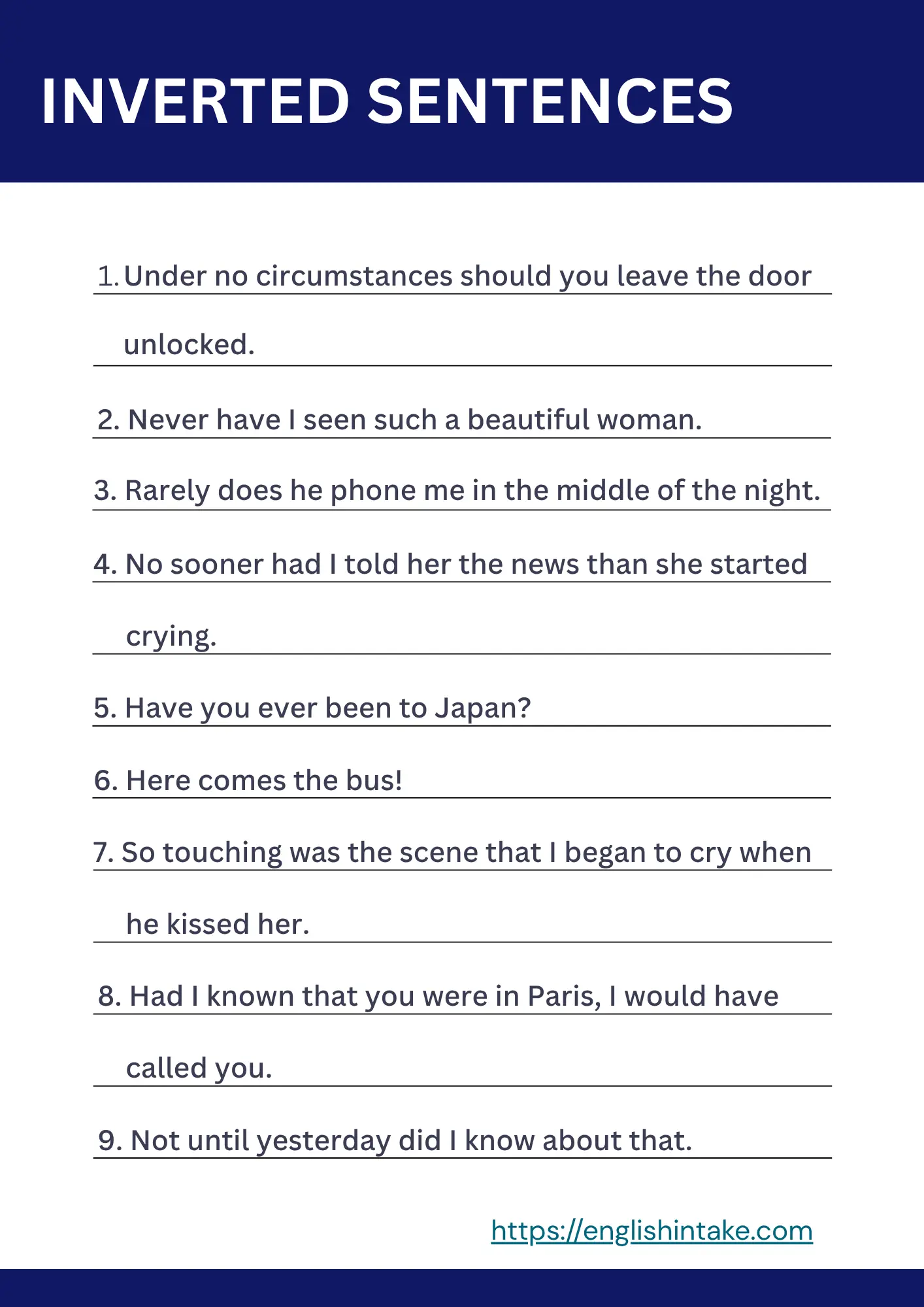1. What are inverted sentences?
Inverted sentences are grammatical structures where the word order (subject + verb + object) is reversed such that the verb is placed before the subject and the object. They are used for emphasis, formality, or stylistic effect. An inversion is common in questions, conditional sentences, and after certain adverbs or phrases.

2. Types of inverted sentences
2.1 Inversion in questions
In questions, the auxiliary verb comes before the subject.
| Normal sentences | Inverted questions |
|---|---|
| She is coming next week. | Is she coming next week? |
| They have finished eating. | Have they finished eating? |
| He will join us later. | Will he join us later? |
| You were listening. | Were you listening? |
| It has stopped raining. | Has it stopped raining? |
| We can leave early. | Can we leave early? |
| They should apologise. | Should they apologise? |
2.2. Inversion with negative adverbs
To invert a sentence with negative adverbs like never, rarely, seldom, or hardly:
- Move the negative/limiting adverb to the start of the sentence.
- Swap the subject and auxiliary verb (like you do in questions).
- If there’s no auxiliary verb, add do/does/did.
| Normal sentences with negative adverbials | Inverted sentences |
|---|---|
| I have never seen such bravery. | Never have I seen such bravery. |
| She rarely makes mistakes. | Rarely does she make mistakes. |
| You should not enter the house under any circumstances. | Under no circumstances should you enter the house. |
| He seldom visits his hometown. | Seldom does he visit his hometown. |
| I had no sooner left than it rained. | No sooner had I left than it rained. |
| They can in no way cancel the event. | In no way can they cancel the event. |
| I knew little about his previous life. | Little did I know about his previous life. |
| I was not aware of it until he told me. | Not until he told me was I aware of it. |
| The movie had hardly started when the power went out. | Hardly had the movie started when the power went out. |
| You must on no account touch this red button. | On no account must you touch this red button. |
2.3. Inverted conditional sentences
In formal or literary contexts, inversion can replace if in conditional sentences.
To invert conditional sentences:
- Remove 'if'.
- Swap the subject and the auxiliary verb.
- For negative conditionals, put not after the subject.
| Normal conditionals | Inverted conditionals |
|---|---|
| If I were you, I would not do that. | Were I you, I would not do that. |
| If I had known his plans, I would have warned you. | Had I known his plans, I would have warned you. |
| If you (should) need help, call me. | Should you need help, call me. |
| If they were to offer the job, would you accept it? | Were they to offer the job, would you accept it? |
| If she had heard the alarm, she would have woken up on time. | Had she heard the alarm, she would have woken up on time. |
| If we (should) arrive late, start without us. | Should we arrive late, start without us. |
| If you were in my position, what would you do? | Were you in my position, what would you do? |
| If she were not the manager, things would be chaotic. | Were she not the manager, things would be chaotic. |
| If you (should) change your mind, let me know. | Should you change your mind, let me know. |
| If she were to accept the job, she would have to live in Paris. | Were she to accept the job, she would have to live in Paris. |
2.4. Place expressions
Inverted sentences can begin with place expressions such as here, there, or prepositional phrases to create vivid imagery or dramatic emphasis.
| Normal sentences | Inverted sentences |
|---|---|
| Your mother is coming here. | Here comes your mother. |
| Your book is there. | There is your book. |
| Vibrant roses bloomed in the garden. | In the garden bloomed vibrant roses. |
| An ancient bridge stood across the river. | Across the river stood an ancient bridge. |
| A homeless man slept under the bridge. | Under the bridge slept a homeless man. |
| A lone eagle soared above the clouds. | Above the clouds soared a lone eagle. |
| Golden sunlight glowed over the prairie. | Over the prairie glowed golden sunlight. |
| A lamp is standing in the corner. | In the corner stands a lamp. |
| A crystal-clear stream flowed between the rocks. | Between the rocks flowed a crystal-clear stream. |
| A forgotten diary lay beneath the oak tree. | Beneath the oak tree lay a forgotten diary. |
Watch the video below for a more in-depth explanation of sentence inversion.
3. Practice quiz
The quiz features 10 multiple-choice questions designed to challenge your ability to recognise and apply inverted sentence structures correctly. Each question will ask you to identify the grammatically sound inverted sentence or spot errors in word order.
Inverted sentence exercise
Quick overview of the quiz!
- There are 10 questions
- You can track your time as you progress
- You get instant feedback on your answers
- You can check your results and review your answers at the end
Time: 00:00
Which sentence uses inversion correctly with “never”?
Which inverted conditional is grammatically correct?
Which sentence uses place inversion correctly?
Choose the correct inversion for: “She rarely speaks French.”
Which is the inverted form of: “If he had known, he would have stayed.”
Identify the correct inversion with “here”:
Which sentence uses negative adverbial inversion correctly?
Choose the inverted version of: “A mysterious figure stood in the doorway.”
Which is the correct inversion for: “I had hardly arrived when the phone rang.”
Identify the grammatically inverted sentence:
